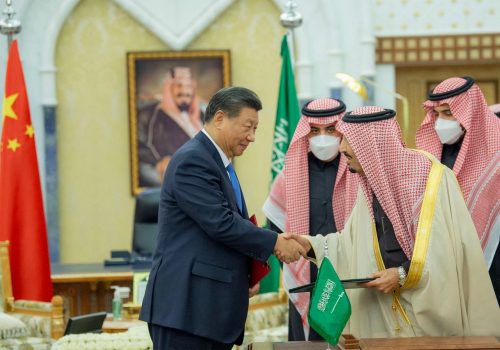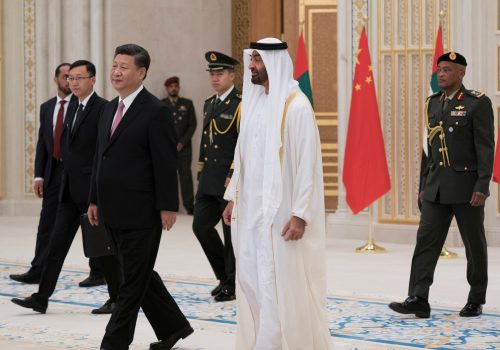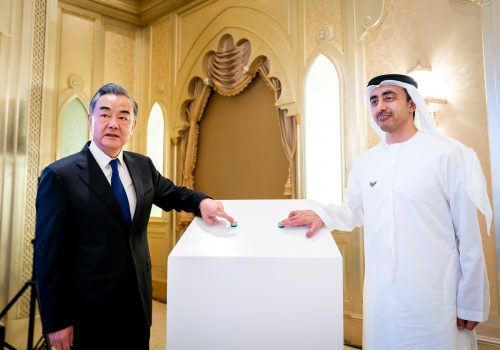Iran’s economic future is uncertain. It’s no surprise why Raisi visited China.
From February 14-16, Iranian President Ebrahim Raisi was in Beijing for his first foreign trip of the year and the first official visit to China for an Iranian leader in twenty years. He traveled with a large delegation, including the foreign minister, the central bank chief, and ministers for oil and mining.
As with any trip like this, the larger significance is found in domestic political objectives. In Iran’s case, years of crippling sanctions and months of protests after the murder of Mahsa Jina Amini by the so-called morality police have resulted in its government needing some positive news. Three days of being feted in Beijing was no doubt seen as an opportunity to change the narrative. China has been Iran’s top trade partner for much of the century and provides an economic lifeline for a government with few other options.
Much of the public messaging expressed mutual support, with Chinese President Xi Jinping calling for an end to sanctions against Iran. He also said that China would “participate constructively” in efforts to resume talks for an agreement on Iran’s nuclear program. Given the Iranian government’s response to protests, however, few other governments—other than China and Russia—are interested in working with Tehran. Until this changes, Xi’s statements are only symbolic.
One important point to contextualize the significance of the trip is Xi’s December 2022 visit to Riyadh—Tehran’s Gulf rival. China held three summits that week—a bilateral one with Saudi Arabia and multilateral ones with the Arab League and the Gulf Cooperation Council (GCC)—underscoring the depth of its relations across the Middle East in countries that generally consider Iran disruptive at best and an enemy at worst.
The billions of dollars worth of deals and memorandums of understanding from the Saudi trip provide a stark contrast. Since the much-hyped comprehensive strategic partnership with Iran was announced in 2021, Chinese firms have invested a paltry $185 million in the country. In a recent interview, Iran’s deputy economy minister Ali Fekri complained that “he is not happy with the volume of Chinese investment in Iran, as they have much greater capacity.” This is an understatement; in the same period, China has invested just short of $5.5 billion in Saudi Arabia, according to data from the American Enterprise Institute.
Worse for Tehran, however, were two points included in the joint statement from the China-GCC summit. The first addressed Iran’s nuclear program, stressing the need to “ensure the peaceful nature of the Iranian nuclear program, in order to preserve regional and international security and stability,” and reaffirmed that Iran fully cooperate with the International Atomic Energy Agency (IAEA). The second affirmed support for the United Arab Emirates (UAE) to reach a peaceful solution to the issue of three disputed islands in the Strait of Hormuz. This dispute, in which Iran has occupied three islands previously administered by the emirates of Ras al-Khaimah and Sharjah, has been ongoing since 1971, and the statement indicates Chinese support for the UAE’s position.
The reaction in Iran was a mixture of outrage and concern. The Iranian government summoned Ambassador Chang Hua to express its official displeasure, while public commentary worried that China was abandoning Iran. A former Iranian diplomat, Abdolreza Farji Rad said, “I have never imagined before that China would ever take a step against Iran’s interests…if this trend in China’s behavior continues, in less than a decade, China will cause as much concern for Iran as America does.”
Leaders in Iran must be worried about the prospect of a less committed China. With Russia—its only other great power partner—bogged down in its disastrous was in Ukraine, the threat of abandonment from China would leave the Islamic Republic more alone than it has been in decades. Raisi’s trip was, therefore, a chance for him to show folks back home that his government has not completely mismanaged its most important bilateral relationship.
What Beijing gets from the visit is less clear. Secretary of State Antony Blinken’s canceled trip to Beijing in the wake of the balloon surveillance story may influence Chinese leaders’ logic. Since ending the zero COVID policy and reopening to the world, Beijing has been trying to repair relationships that were damaged in recent years. This is largely more about pressures at home than from abroad. High youth unemployment, slow economic growth, criticism over government handling of the pandemic, and concerns about the consequences of a rapidly aging population are first-level problems for the Chinese Communist Party (CCP) and have to occupy most of their focus.
Blinken’s canceled trip adds to the list of problems. People in China, already frustrated, cannot be happy to see their government getting bogged down in another unnecessary spat with the United States, which, it must be noted, is China’s most important economic partner, with trade between the two hitting a record $690 billion in 2022.
Does a visit from Iran’s president help with any of this? In material terms, probably not. China is a lifeline to Iran, while Tehran is of marginal importance to Beijing. Despite this asymmetry, however, both share an intense opposition to “hegemony and bullying” from the West, and this normative convergence may result in more material cooperation. For example, Iran’s imminent full membership in the Shanghai Cooperation Organization presents opportunities to coordinate on security, transnational crime, and counterterrorism, giving the bilateral relationship added weight.
At the same time, leaders in China should be careful in the message they send to the Iranian people, using the history of their bilateral relationship as a guide. In August 1978, two days after Prime Minister Jamshid Amuzegar and his cabinet resigned due to their inability to restore order as protests intensified, CCP Chairman Hua Guofeng visited Shah Mohammad Reza Pahlavi in Iran. Expressing no acknowledgment or sympathy of the protests taking place, Hua’s high-profile visit was “a disaster for PRC diplomacy,” resulting in “bitterness among the Islamic insurgent forces soon to take power in Iran.”
Last week on February 15, Peking University, one of the country’s most prestigious institutions, awarded Raisi with the title of honorary professor, noting his services and actions in “maintaining peace and stability in the region and the world.” Hundreds of Iranians have been killed and tens of thousands detained since protests erupted in September 2022, and China is giving the president an award. This is the kind of thing Iranians will not forget.
Jonathan Fulton is a nonresident senior fellow with the Atlantic Council and host of the China-MENA Podcast. He is also an assistant professor of political science at Zayed University in Abu Dhabi. Follow him on Twitter: @jonathandfulton.
Further reading
Thu, Dec 15, 2022
No, Xi’s visit to Riyadh wasn’t because of bad US-Saudi relations. It’s about much more.
MENASource By Jonathan Fulton
Given the bad state of US-Saudi relations, it is natural to see Xi’s visit in the context of geopolitical competition between Washington and Beijing, but that framework misses the bigger picture.
Thu, Jan 27, 2022
China is trying to create a wedge between the US and Gulf allies. Washington should take note.
MENASource By Jonathan Fulton
Recent events indicate that leaders in Beijing are no longer satisfied with the logic of strategic hedging and are pursuing a more muscular approach to the Gulf.
Thu, Feb 3, 2022
China may now feel confident to challenge the US in the Gulf. Here’s why it won’t succeed.
MENASource By Ahmed Aboudouh
Despite China’s growing aggressive approach towards the United States in the region, it has no detailed plan to execute it successfully.
Image: Iranian President Ebrahim Raisi awarding the title of honorary professor of Peking University in Beijing Iranian President Ebrahim Raisi awarding the title of honorary professor of Peking University in Beijing on Feb. 15, 2023. Photo by Iranian Presidency Office/APAimages Beijing Beijing China


